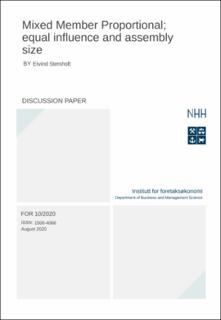| dc.description.abstract | With the present (2020) tally rules, the number of seats in the Bundestag is highly volatile. In 2017 it got 709 seats, 111 of them extra-ordinary. The tally rules may double the influence of a voter who splits the vote; the proportionality requirement may multiply an unfortunate side effect by a high factor. The paper explains when and how this happens.
A ballot’s combination of Erststimme and Zweitstimme is information that now is ignored; the tally is as if Erststimme and Zweitsimme were collected in different ballot boxes. The suggested faithful accounting uses this information. With 2017 data, it is estimated that the number of extra-ordinary seats would have been reduced by about 74, to 37.
Tallying 2017 data with present rules and CDU/CSU as one party reduces the size by 42 seats; combined with faithful accounting, the reduction is more than 74. | en_US |
